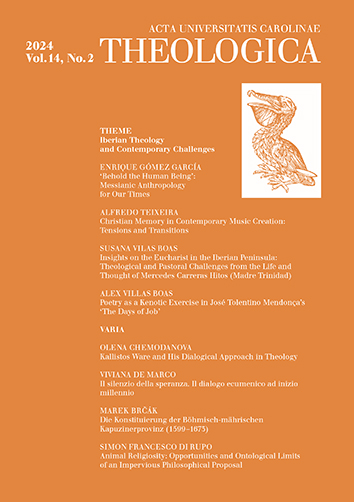AUC Theologica is a peer-reviewed journal for theology published twice a year. As we publish original papers in English, German, French, and Italian, our mission is to serve as a platform both for Czech researchers, who can present their research results in these languages, and for international contributors, who are invited to enter the academic theological discussion in the heart of Europe.
The journal focuses on a wide range of theological disciplines, such as systematic theology, biblical studies, patristic studies, pastoral and spiritual theology, religious education, church history, etc. Within these fields, the journal seeks to reflect the current theological questions and problems, which often requires interdisciplinary approaches. Supporting the intersection of various theological disciplines, we thus also welcome theological papers touching other academic fields including philosophy, sociology, literary studies, and science.
Each issue consists of two sections. The thematic section presents papers of the same focus. The section called ‘Varia’ invites papers dealing with various theological themes from the perspective of all Christian traditions. Our current and past issues are approachable for free on this website in the form of Open Access.
AUC THEOLOGICA, Vol 8 No 1 (2018), 171–201
Interakce křesťanství a zenové buddhistické školy Sanbó Kjódan
[The Interaction of Christianity and the Sanbo Kyodan]
Miloš Hrdý
DOI: https://doi.org/10.14712/23363398.2018.19
published online: 22. 10. 2018
abstract
The Sanbo Kyodan is a contemporary school of Zen that was founded by Yasutani Haku’un Roshi in 1954. Sanbo Kyodan has exerted considerable influence in the development of Zen in the West. Most important for the development of Sanbo Kyodan was Yasutani Roshi’s successor, Yamada Koun Roshi. He attracted a number of Western students, many of whom were Christian’s priests and nuns. The paper aims to describe the Christian Zen movement influenced by Sanbo Kyodan. Essential is the work of the most important Yamada Koun’s students and verified Zen teachers. Among them were three Roman Catholic priests, Hugo M. Enomiya-Lassalle SJ, Ama Samy SJ and Willigis Jager OSB, who went on to become leading figures in the Christian Zen movement. The paper attempts to characterize their understanding of the relation between Zen and Christianity including differences among them.
keywords: Christianity; Buddhism; Zen; meditation; kensho; Sanbo Kyodan; Haku’un Ryoko Yasutani; Koun Yamada; Hugo Makibi Enomiya-Lassalle; Willigis Jäger; Ama Samy

Interakce křesťanství a zenové buddhistické školy Sanbó Kjódan is licensed under a Creative Commons Attribution 4.0 International License.
148 x 210 mm
periodicity: 2 x per year
print price: 100 czk
ISSN: 1804-5588
E-ISSN: 2336-3398
